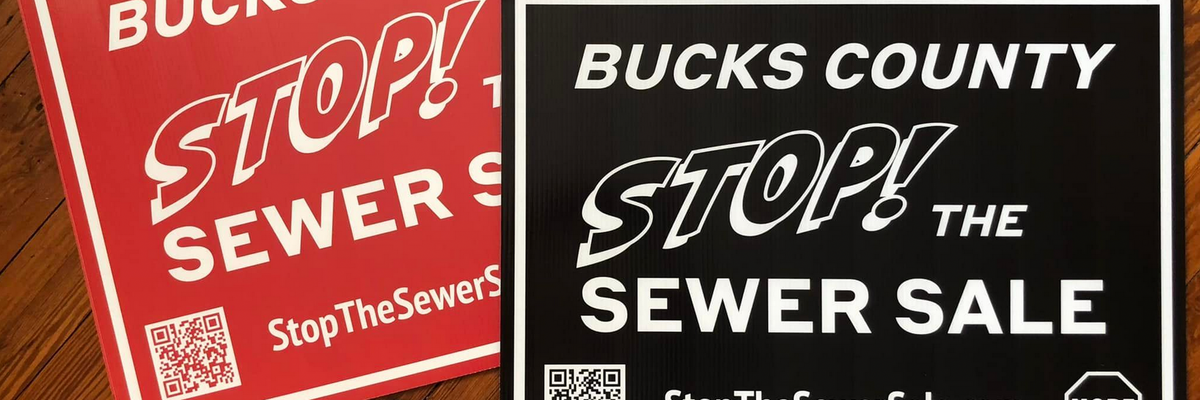Advocates for public utilities are applauding this week following an announcement by the Board of Commissioners in Bucks County, Pennsylvania that officials opposed a plan to sell the county's sewer system to a private company.
"This was a backroom corporate deal from the start, and it only stopped because local residents started to ask questions, voice their concerns, and hold their elected county commissioners who have the power to change the BCWSA's charter accountable."
At $1.1 billion, the proposed sale of the Bucks County Water and Sewer Authority (BCWSA) to Aqua Pennsylvania would have been the largest privatization of a public wastewater system in U.S. history, and local residents had planned to rally against the proposal at Wednesday's Board of Commissioners meeting before all three commissioners on Tuesday urged the BCWSA to halt the sale.
"What we heard from the public was clear, nonpartisan, and near-universal: Do not sell off the publicly run BCWSA sewer system to a private entity," said Diane Ellis-Marseglia, vice chair of the board.
The chairman of the water and sewer authority confirmed Tuesday that the sale would not go through, saying in a statement, "We were never going to be in conflict with the commissioners' position."
The proposal garnered outcry when it was publicized in April, with local group Neighbors Opposing Privatization Efforts (NOPE) warning that handing over control of the public utility would lead to escalating sewer bills for residents and eliminate local control.
About 100,000 residents in 31 towns across Bucks, Montgomery, and Chester counties pay an average of $48 per month for water and sewer service, according toThe Philadelphia Inquirer. Aqua proposed freezing current rates for a year but then increasing them to match its monthly rate, which is currently $88.
Local anti-privatization campaigners applauded the decision by the commissioners, noting that the state must act to stop companies from taking control of public services, as has happened in a growing number of towns since new rules were passed in 2016 encouraging local officials to sell public utilities.
"We are thankful to the commissioners and to the Board of the Authority for coming to this decision," said David McMahon, co-founder of NOPE. "We are grateful to all the residents, township officials, [and] utility workers who devoted considerable time and effort in these past weeks to share the information, spread the word, and stand together in time to turn this sale back. It is important to recognize though, that our state legislators still have a role to play."
McMahon urged members of the Pennsylvania General Assembly to reject S.B. 597, which water rights campaigners say would saddle small municipal systems with "new, inappropriate requirements and oversight fees, which could force them to privatize."
"Our public utility acquisition laws are still broken and there are currently communities fighting these corporate takeovers of public property," said Kofi Osei, a community organizer with NOPE. "The way our utility code is written opens up the floodgates for potential corruption. We need to severely narrow the scope of when privatization is acceptable and give ratepayers a seat at the table with referendum."
Mary Grant, a right to water campaign director at Food and Water Watch (FWW), which also spoke out against the privatization scheme, called the local organizing effort against Aqua's plan a "rallying cry" against corporate takeovers, while the group's Eastern Pennsylvania organizer, Ginny Marcille-Kerslake, credited the residents with stopping the deal.
"This was a backroom corporate deal from the start, and it only stopped because local residents started to ask questions, voice their concerns, and hold their elected county commissioners who have the power to change the BCWSA's charter accountable," said Marcille-Kerslake. "Getting the board to see the light and slam the brakes on this terrible deal is a huge win for clean water, public input, and democracy itself."
The commissioners' announcement came a day after Mississippi Gov. Tate Reeves, a Republican, suggested that the solution to the state capital's water emergency was privatization. After decades of disinvestment in Jackson's water system and recent flooding, residents faced a major drop in water pressure and were left without safe drinking water.
"Corporate interests now seek to exploit the devastation in Black and brown communities like Baltimore and Jackson," Grant toldThe Guardian Thursday. "[But] privatization would exacerbate the harm by extracting resources and driving up water bills for communities already in an affordability crisis."



